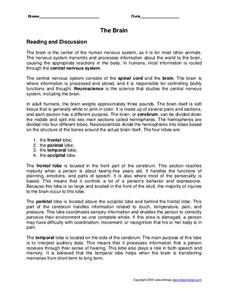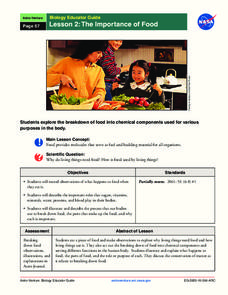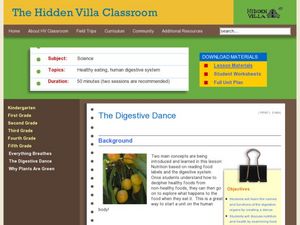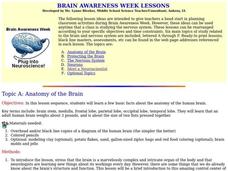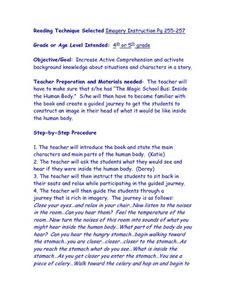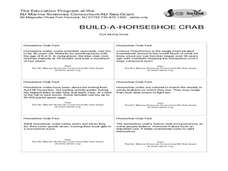Curated OER
Autopsy Questions
In this autopsy activity students study how an autopsy is performed then answer a series of questions including how the parts of the body are examined.
Curated OER
Building Bodies
Students identify key anatomical similarities and differences between great apes and humans. They infer likely anatomical features in ancient human ancestors and list principal anatomical changes in primates necessary for adaptation to...
BBC
Ourselves
Young biologists identify parts of the body, sort humans from other animals, and list the difference they see. Learners are split up into groups of three, and each group must find pictures in magazines of humans and other animals. They...
Curated OER
Brain Awareness Week
Students explore human anatomy by completing a list of activities over five days. In this brain science lessons, students examine images of brains and identify the different parts. Students complete an in-class quiz regarding brain...
Nemours KidsHealth
Head Lice: Grades K-2
Head lice—how not to get or give it. Scholars read or listen to kid-friendly articles that offer information about head lice. They complete a worksheet that identifies items they should and should not share with their peers.
Curated OER
P.L.E.P: Parts of Blood
Middle schoolers examine the different parts of blood. In this human blood lesson plan students work in groups and identify parts of blood and construct a model of human blood.
Curated OER
Organ Systems
Students state the name of major body systems, They identify what each system does and list the major organs in each system. In addition, they complete a puzzle matching organ systems to organ function.
Curated OER
The Brain
In this brain worksheet, students read about the brain, its four parts, and their functions, and answer comprehension questions. In this fill in the blank and true and false worksheet, students answer thirteen questions.
Curated OER
Digestive System
Young scholars analyze how the digestive system works by taking the food we eat and breaking it down for our bodies to use for various reasons. They list the major components of the digestive system and draw a diagram. They explain how...
Curated OER
Case Study Two: Shark Dissection
Students read an article on sharks prior to beginning a dissection lab. As part of the lab, students identify differences between the shark anatomy and human anatomy and hypothesize why those differences exist.
Scholastic
Heads Up: Real News About Drugs and Your Body
What's the difference between medical marijuana and marijuana bought on the street? Not much. High schoolers learn more about marijuana with an informational booklet that focuses on the medical uses of THC, how marijuana affects the...
Curated OER
Fetal Pig: Circulatory System
Step-by-step instructions for fetal pig dissection and viewing of the circulatory system is given in this exercise. Your young biologists match the names to the organs or label a diagram of the pig circulatory system. This resource is...
NASA
The Importance of Food
Pupils make observations while eating food. They act out the process of food breaking down in the body and the roles of various chemical components, such as sugar and protein. It concludes with an activity illustrating the process and a...
Curated OER
The Strongest Pump of All
Students examine how the heart functions and the concept of how electrical currents can affect muscle contractions. In this cardiovascular lesson plan students identify P, QRS and T complexes.
Curated OER
The Digestive Dance
Learners read food labels to compare healthy verses non healthy food and then use diagrams to create a poster of the digestive system. In this food lesson plan, students move the food down the digestive track along the digestive system.
Curated OER
Brain Awareness Week
Young scholars explore the brain. In this science lesson, students create a model of the brain and discuss steps taken in order to protect the brain. Young scholars design a container that would protect the brain from injury. Students...
Curated OER
Excretory System
Learners discuss what happens to the trash in their home. They talk about what would happen if they didn't remove the trash. Students relate their home trash to the excretory system of their bodies. They label a diagram of the urinary...
Curated OER
The Digestive System: An Overview
Young scholars label main structures of the digestive system, describe each structure's function, and describe sequence of events involved in digestion.
Curated OER
Plant Structure and Growth
This plant structure and function PowerPoint addresses the main organs and the factors that affect its development as well as going into detail about the specializations at a cellular level. The cell functions and system adaptations...
Curated OER
Wellness and the Benefits of Exercise
Second graders discuss benefits of keeping physically fit, predict effects of exercise on their bodies, perform various exercises correctly, including push-up, curl-up, and jumping jack, discuss and follow safety practices while...
Curated OER
What is Physical Fitness?
First graders explore and discuss what physical fitness actually is, its benefits and how to obtain it through a variety of ways. They summarize the five parts of physical fitness: cardiovascular endurance,muscular strength, muscular...
Curated OER
Imagery Instruction
Learners study how imagery affects their comprehension of stories. They participate in a guided journey of The Magic School Bus: Inside the Human Body. They compare the information from the book and their guided journey.
Curated OER
Build-A-Horseshoe Crab
Students discover many facts about horseshoe crabs. Students identify the main body parts of horseshoe crab. They explore the habits of the horseshoe crab and their importances to the ecosystem. Adaptations for younger students are...
Curated OER
All in the Family: Calculating Cousins
Learners view pictures of distant "cousins" to humans. They place them in order by their distance from humans. Students receive a packet of six pages featuring graphics and a cousins summary page. They work in groups to complete 5 cousin...









